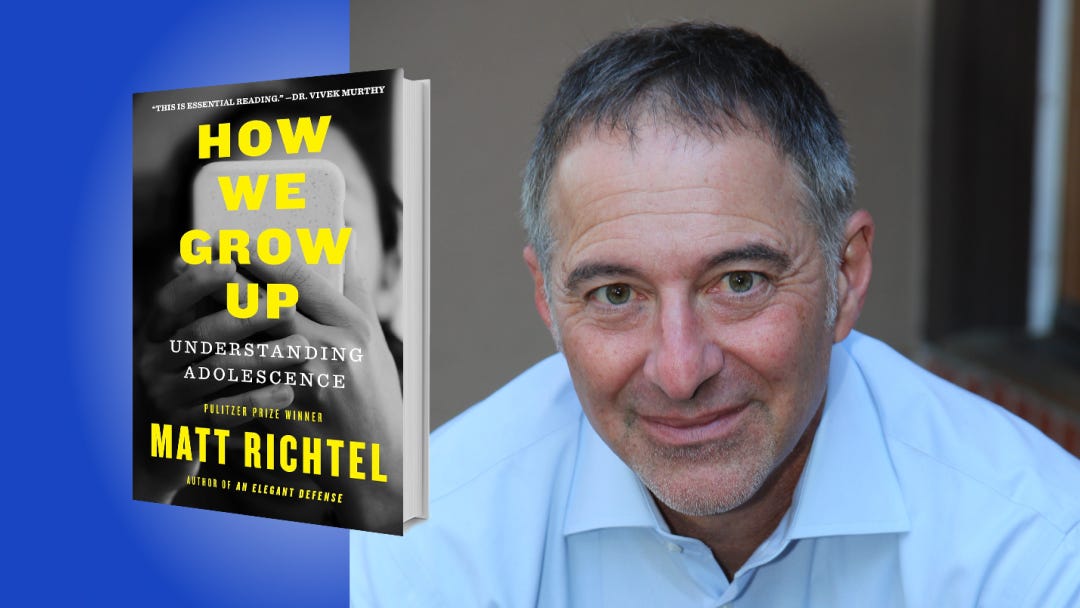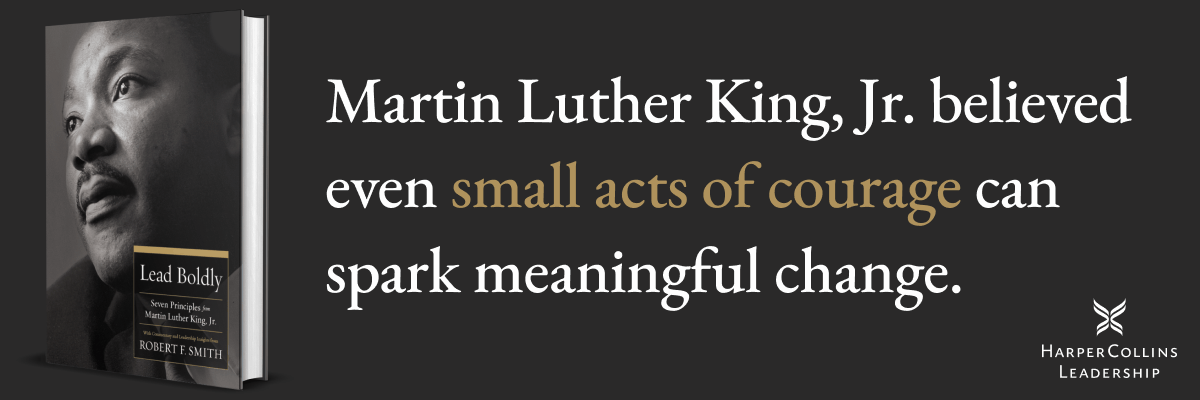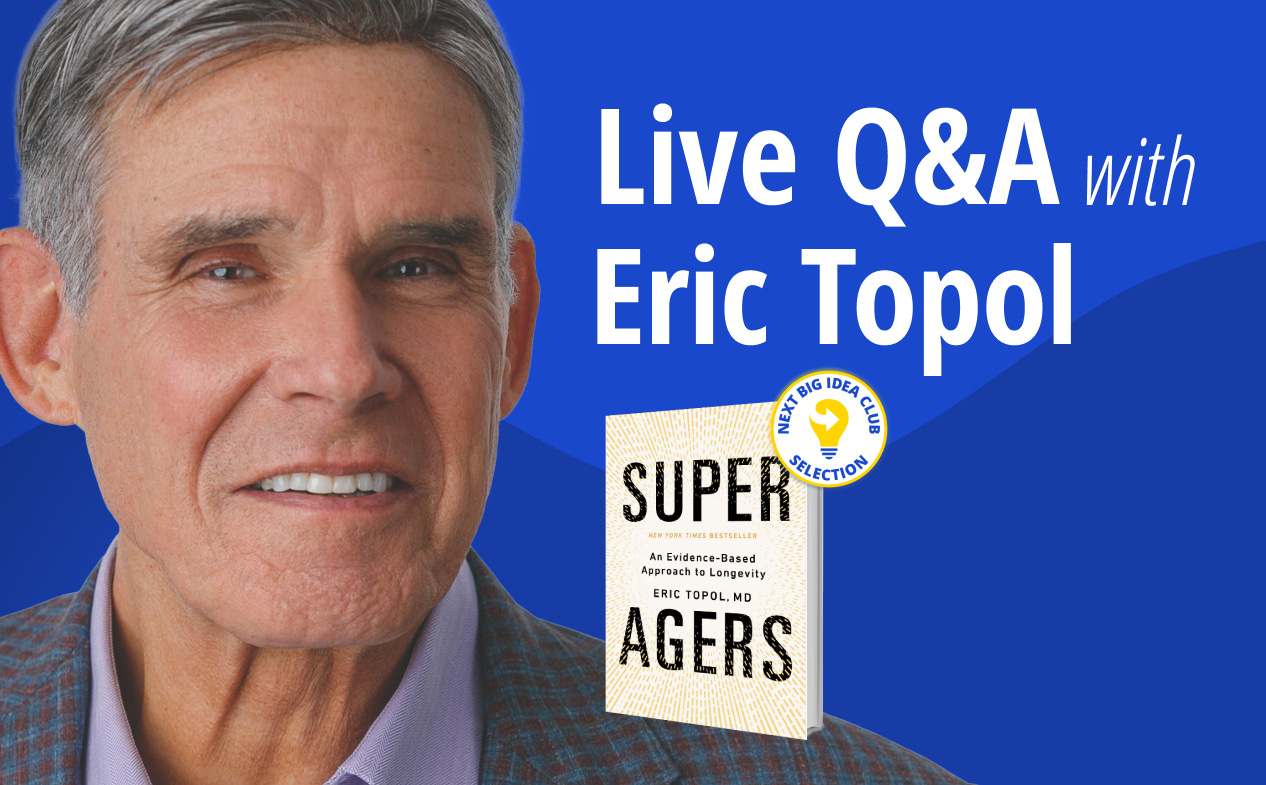Why Your Teen Thinks You’re an Idiot
And why that might be a sign their brain is working perfectly.
Listen now on Apple Podcasts or Spotify:
A personal note: last week my daughter turned 20. And while it’s been a bittersweet joy to watch her grow up, I’ll admit—I’m relieved her teenage years are behind us.
If you’ve raised an adolescent—or been one—you already know it’s a life stage that can feel like an emotional rollercoaster—full of drama, defiance, and slammed doors. But what if all that chaos wasn’t a bug… but a feature? Today we’re hearing from Pulitzer Prize–winning New York Times journalist Matt Richtel, who says adolescence is a brilliant, necessary phase of human development. In his new book How We Grow Up, Matt explains how teenage brains are wired to question, rebel, and innovate—and how that friction might just be the thing that helps our species survive. Pick up a copy on Amazon or read 5 of Matt’s key insights below.
1. What is adolescence?
Set aside the idea that adolescence is a period when puberty prepares young people for reproduction. I’m not speaking here about the sexual sides of adolescence. I’m speaking about what is happening inside their brains and why adolescence is a process that integrates the known and the unknown.
What is known is what parents teach: Use a fork. Do your homework. This is how the world works. This is what you do to survive and succeed. What is unknown to these adolescents is what actually works in the real world because the real world is transforming and changing.
Adolescents reconcile what they’ve been told with what they are experiencing while carving out new ground that lets them not be beholden to the prior generation. Adolescents are hypersensitive information-processing machines that make sense of the world as they adapt to it.
2. Biologically, adolescents are programmed to test and probe.
As children, they have not needed to understand much about the world around them. They’ve been tuned into the voice of their parents and cared for under their roof, but now they are maturing into creatures that must care for themselves and their offspring.
“Adolescents reconcile what they’ve been told with what they are experiencing while carving out new ground that lets them not be beholden to the prior generation.”
This is a major transition biologically. At puberty, the hormones that are released sensitize young people to the world around them. They begin to tune into their peers more (the people they must work with to survive) and less so their parents. During this period, adolescents are wired to seek reward and be more tolerant of risk. In this way, they can probe and experiment with a little more resilience and courage than someone older. Experts often describe the adolescent brain as having more accelerator than brake. They are in the ramp-up period because they now need to learn how to deal with reality.
This week, Book of the Day is brought to you by Lead Boldly, a transformative read that marries the timeless wisdom of Dr. Martin Luther King, Jr. with practical leadership strategies. This remarkable guide offers a deep dive into the principles that defined Dr. King’s impactful leadership and provides actionable insights to incorporate his visionary ideals into your own leadership journey. Get your copy today.
3. The surge of conflict in adolescence.
The idea of conflict has been the singular watchword of adolescence studies since its scholarship began in 1904, but the reasons that people assumed there was conflict were largely wrong. At the turn of the 20th century, scholar G. Stanley Hall thought that adolescents were a primitive form of human and adults were civilized creatures. In his estimation, the clash between adult and adolescent was a conflict between the primitive and the civilized. What followed subsequently were ideas that the conflict stemmed from repressed sexual urges in adolescents as they tried to become mature. We now understand that these early ideas were simplistic.
The conflict comes from individual adolescents reconciling the old or the known with the new or unknown. What an adolescent experiences in the world does not always add up with what they were taught. They are trying to make sense of and honor what they’ve been told by the people who have cared for them while taking in lots of new information from a peer group that is in a transition period itself.
“Think of the generation of adolescents as a group of startups challenging a corporate structure that already exists—but these are clumsy startups.”
It’s important to think of adolescents both as individuals and as a generation because the conflict comes from a generational shift as well. Think of the generation of adolescents as a group of startups challenging a corporate structure that already exists—but these are clumsy startups. They’re coming up with new ways to frame the world in the context of people who already feel like they understand the world. Parents act as the management of these younger people who are saying, Let’s try something else.
Young people are carving out new ideas not simply to be irritants. It is because, for their economic survival and for the survival of the species, diversity is vital. Diversification keeps the species from becoming stagnant. We need adolescents to carve out new ground. They are doing the yeoman’s work of our survival.
4. New problems are emerging for adolescents.
The first big problem is that the age of onset for puberty has fallen. When puberty hits, it sets off hormones that highly sensitize the adolescent brain to the world around them. In the information age, this sensitization is occurring in an environment that inundates the adolescent brain with information. There is a lot of talk that devices, like cell phones, are leading to a mental health crisis among adolescents. Adolescent brains are becoming highly sensitized at a younger age during a period in which information flows fast and furiously.
“Adolescents are doing the yeoman’s work of our survival.”
There is a neurological mismatch between how much adolescents take in and what they’re capable of processing. Sometimes this leads their biological information processing systems to shut down. It can take the form of anxiety, depression, and lots of other disorders.
5. We have a profound opportunity to take lemons and make lemonade.
When your kiddo says, Everyone in eighth grade hates me, I hate all the food that you make, and I wish I was dead, it is not possible to directly take on the substance of what the young person is talking about. Those are moments of information overload, and when you have a time of information overload, what the system needs is not a conversation. What the system needs is a reboot.
There are tools like cognitive behavioral therapy and dialectical behavioral therapy, but also much simpler solutions that you can do from home. They include simple tasks like taking a freezing cold shower or getting some exercise. These activities help the adolescent move beyond this intense, emotional experience that has effectively paralyzed their brain.
We have an opportunity to help equip young people to navigate our complex information society: we can grow up collectively. Adolescents are reconciling a fast-moving world with a brain that can be overwhelmed, but so are we as adults. Collectively, we can grow up using the coping mechanisms that get us through this unyielding, difficult period. I am hopeful that now that we understand adolescence, we can tackle it together and create a happier, healthier, and saner young generation.
This Week: Member Book Chat
Our next Members-Only Book Chat will be on August 7th at 11am ET. We will be discussing Eric Topol’s book Super Agers: An Evidence-Based Approach to Longevity.
If you’re not a paid subscriber, become a member to see the RSVP link below and claim your spot!






